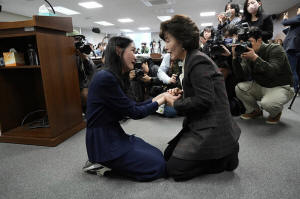South Korea’s truth commission says government responsible for fraud and
abuse in foreign adoptions
[March 26, 2025]
By KIM TONG-HYUNG
SEOUL, South Korea (AP) — South Korea’s truth commission concluded the
government bears responsibility for facilitating a foreign adoption
program rife with fraud and abuse, driven by efforts to reduce welfare
costs and enabled by private agencies that often manipulated children’s
backgrounds and origins.
The landmark report released Wednesday followed a nearly three-year
investigation into complaints from 367 adoptees in Europe, the United
States, and Australia, representing the most comprehensive examination
yet of South Korea’s foreign adoptions, which peaked under a succession
of military governments in the 1970s and ’80s.
The government-appointed Truth and Reconciliation Commission said it
confirmed human rights violations in 56 of the complaints and aims to
review the remaining cases before its mandate expires in late May.
However, some adoptees and even a commission investigator criticized the
cautiously written report, acknowledging that investigative limitations
prevented the commission from more strongly establishing the
government’s complicity.
That investigator, Sang Hoon Lee, also lamented that the panel on
Tuesday deferred assessments of 42 other adoptees’ cases, citing a lack
of documentation to sufficiently prove their adoptions were problematic.
Lee and the commission chairperson, Sun Young Park, did not specify
which types of documents were central to the discussions.
However, Lee implied that some members of the commission's
decision-making committee were reluctant to recognize cases in which
adoptees had yet to prove beyond doubt that the biological details in
their adoption papers had been falsified — either by meeting their birth
parents or confirming information about them.

Most Korean adoptees were registered by agencies as abandoned orphans,
although they frequently had relatives who could be easily identified or
found, a practice that often makes their roots difficult or impossible
to trace. Government data obtained by The Associated Press shows less
than a fifth of 15,000 adoptees who have asked South Korea for help with
family searches since 2012 have managed to reunite with relatives.
Lee said the committee’s stance reflects a lack of understanding of the
systemic problems in adoptions and risks excluding many remaining cases.
“Personally, I find yesterday’s decision very regrettable and consider
it a half-baked decision,” Lee said.
Promoting adoptions to reduce mouths to feed
After reviewing government and adoption records and interviewing
adoptees, birth families, public officials and adoption workers, the
commission assessed that South Korean officials saw foreign adoptions as
a cheaper alternative to building a social welfare system for needy
children.
Through policies and laws that promoted adoption, South Korea’s military
governments permitted private adoption agencies to exercise extensive
guardianship rights over children in their custody and swiftly transfer
custody to foreign adopters, resulting in “large-scale overseas
placements of children in need of protection,” the commission said.
Authorities provided no meaningful oversight as adoption agencies
engaged in dubious or illicit practices while competing to send more
children abroad. These practices included bypassing proper consent from
biological parents, falsely documenting children with known parents as
abandoned orphans, and switching children’s identities, according to the
commission’s report. It cited that the government failed to ensure that
agencies properly screened adoptive parents or prevent them from
excessively charging foreign adopters, who were often asked to make
additional donations beyond the standard fees.
The commission’s findings broadly aligned with previous reporting by The
AP. The AP investigations, which were also documented by Frontline
(PBS), detailed how South Korea’s government, Western countries and
adoption agencies worked in tandem to supply some 200,000 Korean
children to parents overseas, despite years of evidence that many were
being procured through questionable or outright unscrupulous means.
[to top of second column]
|

Truth and Reconciliation Commission Chairperson Park Sun Young,
right, comforts adoptee Yooree Kim during a press conference in
Seoul, South Korea, Wednesday, March 26, 2025. (AP Photo/Ahn Young-joon)

The military governments implemented special laws aimed at promoting
foreign adoptions, removing judicial oversight and granting vast
powers to private agencies, which bypassed proper child
relinquishment practices while shipping thousands of children to the
West every year. Western nations ignored these problems and
sometimes pressured South Korea to keep the kids coming as they
focused on satisfying their huge domestic demands for babies.
“The commission determined that the state violated the human rights
of adoptees protected under the constitution and international
agreements, by neglecting its duty to ensure basic human rights,
including inadequate legislation, poor management and oversight, and
failures in implementing proper administrative procedures while
sending large numbers of children abroad,” the commission said in a
statement. It said the government “actively utilized” foreign
adoptions, which “required no budget allocation,” rather than
strengthening a social safety net for needy children.
When asked why the commission’s report focused on the government’s
negligence and monitoring failures, rather than highlighting its
more direct responsibility for creating a system that put children
at risk, Lee acknowledged a need for a deeper investigation into the
government’s role, citing limitations in the commission’s reach.
A more extensive review of the systemic problems would require a
closer look at adoptions to the United States, which by far was the
largest recipient of Korean children, Lee said. U.S. adoptees
accounted for a smaller number of complaints received by the
commission, most of which were filed by adoptees in Europe.
“Rather than producing a final conclusion, we focused on pointing
out the problems the best we could,” Lee said.
Commission calls for government apology
The commission recommended the government issue an official apology
over the problems it identified and develop plans to address the
grievances of adoptees who discovered that the biological origins in
their adoption papers were falsified. It also urged the government
to investigate citizenship gaps among adoptees sent to the United
States and to implement measures to assist those without
citizenship, who may number in the thousands.
South Korea’s government has never acknowledged direct
responsibility for issues surrounding past adoptions. The Ministry
of Health and Welfare, the government department that handles
adoption issues, and adoption agencies didn’t immediately comment on
the commission’s report.

During the news conference, Yooree Kim, who was sent at age 11 by an
adoption agency to a couple in France without her biological
parents’ consent, pleaded for the commission to strengthen its
recommendations.
She said the government should encourage broader DNA testing for
biological families to increase the chances of reunions with
adoptees and officially declare an end to foreign adoptions. She
said adoptees who fell victim to illicit practices should be
entitled to “compensation from the Korean government and adoption
agencies, without going through lawsuits.”
South Korea's practices in the past seven decades formed what’s
believed to be the world’s largest diaspora of adoptees. Recent
reforms, including a 2011 law that required foreign adoptions go
through family courts, have led to a significant decline, with only
79 cases of South Korean children placed abroad in 2023.
All contents © copyright 2025 Associated Press. All rights reserved |